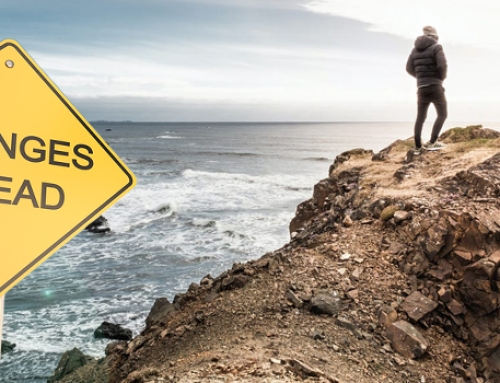There was a time when I was new to all this self-reliance stuff and to be honest, that time was not that long ago. The memory of getting started is still fresh in my mind to this day, I am in awe of those objectives that seemed so far ahead of me. That is not to say that I am not prepared; it is just that there is still a lot I need to learn to feel really comfortable in my own self-sustaining shoes.
These days a lot of my tasks have to do with learning and becoming skilled at new things. How to use my gear, how to use a pressure canner, how can I recognize those edibles in the wild, how to make my own home healing remedies? The list is endless. Added to that is the desire to add to my food stores and the need to establish better relationships with like-minded members of my community.
With all that is left to do, I believe that there is still room for considerable awesomeness.
Whether you are just getting started or you are an old hand at prepping, today I describe 13 ways to become an awesome prepper along with some useful links to guide you along the way.
Ways to Be Awesome at Self-Reliance
1. Have an emergency plan
Ask yourself: “What would I do if there was a catastrophe that affected my home and my family?”
Think about the risks inherent to your geographical area and your own vulnerability when it comes to those risks. Once you do that, come up with a plan for preparing, responding, and recovering if the worst should happen.
You first need to visualize it before you can actualize it!
2. Put together an emergency kit for houeshold member
Get together the items you will need to get through a suspected disaster safely. Remember, weight is a huge consideration in putting this together BECAUSE you are more than likely going to be carrying it on your back. In addition to flashlights, batteries, straw filters and a hand-wound emergency radio, you are going to need other basic gear plus hygiene items, medications, cash, and some extra clothing. Don’t forget the special needs of each member of your family and the that includes the family animals.
Your kit should be portable and light enough that you can handle it on your own.
See: Our First Steps Combo eBooks Click Here
3. Store plenty of water
Along with having water in your Survivial Kit, you can also gather while the getting is good, the water reserves that you would need in case of a storm, earthquake, tornado, hurricane or a host of other calamities that could happen. Clean water is something we all take for granted. We turn on the faucet and there it is. It is plentiful, it is clean and it is drinkable. Beyond collecting it, learn where to find it, how to store it, how to purify it and how to filter it. Whether you are a prepping newbie or an experienced survivalist, water should be high on your list of prepping priorities.
4. Have emergency food supplies
Although not eating can help us with our waistlines, in times of high stress and disasters, eating keeps our energy up and our immune systems functioning. Fortify your home with enough food to get by for a minimum of seven days, and longer if you can afford to do so. Don’t need to spend thousands, and it doesn’t have to be “survival food”. Just a little more each time you go to the grocery store that is all it takes.
Inventory what you have then come up with some reasonable goals for adding to your food supply weekly, with every visit to the grocery store. Build up your food supply using foods you like to eat that also have a long shelf life.
5. Be a good neighbor
In times of extreme situations, it is always good to know who are your neighbors. So that you can anticipate which ones can be counted on in a clutch. Likewise, learn to be a good neighbor so that you can be a solid foundation for folks in their time of need. It isn’t just about the surviving, it is showing who you truly are, or want to be in any given situation, good or bad.
6. Learn the strategies to properly shelter in place
Identify, outfit, and prepare an area of your home that is suitable for a “shelter-in-place” emergency. If possible, select a room that is isolated from exterior doors and windows, and outfit it so that you can remain there in relative comfort until the emergency passes. People call them “safe rooms”. Keep in mind that if you shelter in place, you will rely upon supplies in your emergency kit as well as specific shelter-in-place items such as sheets of plastic and duct tape.
7. Prepare to survive without power
One of the most common emergencies does not need to be an emergency at all if you are well prepared. I am talking about a blackout, grid-down, short-term power outage. As recent events have taught us, a freak storm can bring the power grid down for a few days, a week, or even longer. Learn to cope with plenty of light sources as well as cooking and heating facilities.
8. Have an emergency fund (and it can mean more than money)
It always sucks when you don’t have enough money. And that goes doubly in a time of disasters. You need to be able to put away for those days that rain and those days there is a tsunami. Building up an emergency fund when you are barely scraping by may be difficult but it is not impossible. Go slowly and you will be surprised by how quickly those dollars add up.
Now, this could also mean the value of commodities. Things that when there is no cash available (for anyone) that can be used in lieu of money. TP, food, and any other items that could be used for trade or barter.
9. Stay fit and healthy and live a strategic life
When the world is in disarray, you aren’t going to be able to call a time out to rest. You will need to be health-conscious and keep at least your stamina up with regular exercise. It is the cornerstone to long-term survival during stressful situations. You’ve got nothing unless you have your health!
Living strategically means living your life full of abundant adventure while embracing the tenants of simplicity and self-sustainability. It means being healthy and reaping the benefits of bounteous friendships and caring relationships. It means living a life full of happiness and readiness, without the burden of wanting to be someone else or someplace else. It means liking yourself and moving forward with this business of life with animated spirit and optimism.
10. Have a survival mindset
Although this one appears at the bottom of this list, it is certainly the first thing you need to acquire. It is of utmost importance to hone your ability to prepare and stay focused on this all-essential journey I call being Self-Reliant. Reading this blog and others like it is the first step toward establishing a survival mindset. That, and having the will and the perseverance to keep going is what it takes to be AWESOME at Self-Reliance.
Test Your Awesome Quotient
Why not up your score to determine your awesome quotient? How many of those things listed you can honestly say, “Yep, that’s me!”?
Wherever you are, I promise not to rank you nor to judge. If anything, I want to make you realize that you are a lot better off than your thought your were, even if you are a newbie and just getting started.
The passing score of this test is one – just one – and that is all I am going to say about that!
The Overall TakeAway
Awesomeness is awesomeness no matter how you slice it. And you can get Awesome doing this list or doing your own. Think yours through, write all about them. It could take days if not weeks and would fill a book and not just a single web page. That said, there is no magic potion that you can take to become awesome at being Self-Reliant. It takes time, perseverance and diligence as well as the mindset to keep going in spite of setbacks- real or perceived.
Remember that knowledge and know-how are at the center of all this. It does not start and stop; it only keeps ongoing. Over the coming months, I hope to learn, refresh and revitalize the subjects we need to study and practice for sustainability. You too can search for topics that will help you live your lives fully today as well as during a future that is filled with unknowns and uncertainties.






